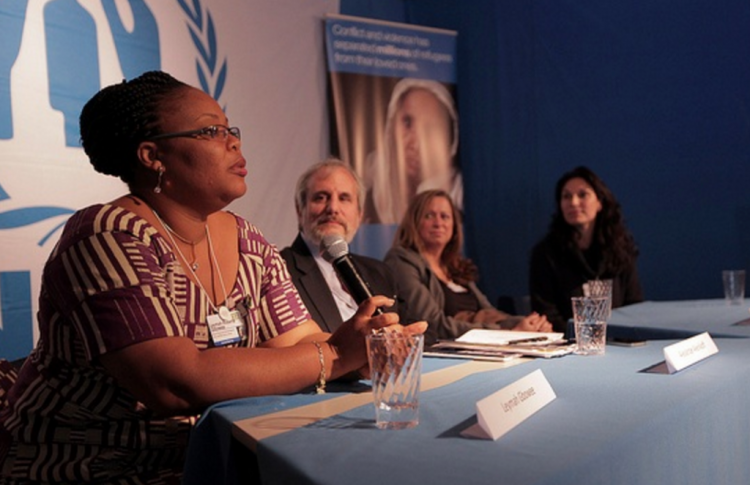Not sure what’s on your DVR, but mine is filled with a mixture of Charles Osgood’s Sunday Morning brilliance, PBS, The Blacklist, The Walking Dead, and ALL of Shonda Rhimes’ shows. Since its debut twelve seasons ago, Meredith Grey and her colleagues from Grey’s Anatomy have been a big part of my TV fantasy life. I feel like I know them. They’re my person.
So anyone who watches Grey’s on Thursday nights knows the episodes usually start with Meredith pontificating on something that is a prelude to the drama unfolding. Last week’s prologue really stood out to me as a presentation/public speaking coach.

Grey’s Anatomy, Season 12, Episode 9 “The Sound of Silence”
Meredith: “In group settings, men are 75% more likely to speak up than women. And when a woman does speak up, it’s statistically probable that her male counterparts will either interrupt her or speak over her. It’s not because they’re rude. It’s science. The female voice is scientifically proven to be more difficult for a male brain to register. What does this mean? It means, in this world, where men are bigger, stronger, faster, if you’re not ready to fight, the silence will kill you.”
So I started Googling to see if these statistics are true. Took me a while but I finally came across this article about a Brigham Young University study that suggests the same. Essentially, researchers found that having a seat at the table is very different than having a voice. Let that sink in for a moment.
“Sit, puppy!”

Then, I started thinking about my dog, Dixie. (Don’t give me crap about her name. We allowed my then 3-year-old son to name her.) We rescued this sweet puppy from the pound ten years ago. I spent the next three months getting up with Dixie every two hours in the middle of the night to take her out to use the bathroom. We also took her to Puppy School for 6 weeks where Dixie was the star of her class. But only when my husband spoke the commands. Not me. Not the person who was in and out of bed all night, cleaning up Dixie’s many “accidents.” Even today, Dixie only “listens” to Daddy.
Geez, I’m seeing a pattern here.
Doing my research today, I also ran across an article about why nearly all the voices of our virtual personal assistants are women. As I read through it, my blood began to simmer and then outright BOIL. What does Siri represent?????
“First there’s the obvious answer, which is that we’re supposed to associate digital assistant work with traditional women’s roles. Siri is a mother who actually cares about you, and Cortana is the most competent secretary you ever had.”
The writer goes on to ask, “So what is it that Siri and Cortana deliver that a male voice cannot?”
And she answers, “I think the answer is submission.” Deep breaths.
So I kept Googling and found this article, which explains that many high-tech companies’ focus groups found that humans simply prefer the sound of a woman’s voice. It’s actually nature. Babies in the womb react to their mothers’ voices far more than their fathers’ deeper tones.
(Funny enough though, in the UK and France, Siri’s voice is male. That’s another blog post, right?)
Getting Off My Soap Box

Okay, okay…I’m getting off my soap box. I feel my rant is offering no solution and, instead, spewing a statement on where women still stand in our society today. So I’m stepping back, realizing there are two important factors here:
- The physical, auditory elements of female voices. They elicit different responses from people. Not being a speech therapist, I can’t explain the technical aspects of it. I just know that I prefer to listen to certain voices over others. Don’t you?
- The actual message being delivered by that voice. This is where I can offer insight. After a 20-year career as a television journalist where my voice was an integral part of my job, I clearly understand the impact of what I say and how I say it. Now as a presentation coach, I work closely with our clients on crafting meaningful messages and delivering them with complete authenticity. That is how you are heard. That is how your seat at the table becomes more than a placeholder.
A Seat at the Table

Nobel Peace Prize winner Leymah Gbowee is a trailblazer who showed the world the power of being heard, both literally and figuratively. Through her voice and her conviction, Gbowee got a ruthless dictator in Liberia removed from office and was a catalyst to getting the first female president elected in Africa. Gbowee changed history and has emerged as an international leader. And it all started with her ability to find her voice.
There are countless other women who also have influenced positive change in our society. And it doesn’t have to be Nobel Prize material. Sometimes it’s just knowing how to speak with the right tone and honesty to comfort a child or inspire a colleague. These are meaningful moments that change our world, one step at a time.
Your Voice
Do you feel that people are listening to you?
Whether it’s at a staff meeting, a boy scout outing or at the dinner table, are you heard?
We teach that only through truthful, sometimes vulnerable exchanges will you make an impact.
We invite you to begin the journey to finding your authentic voice.

